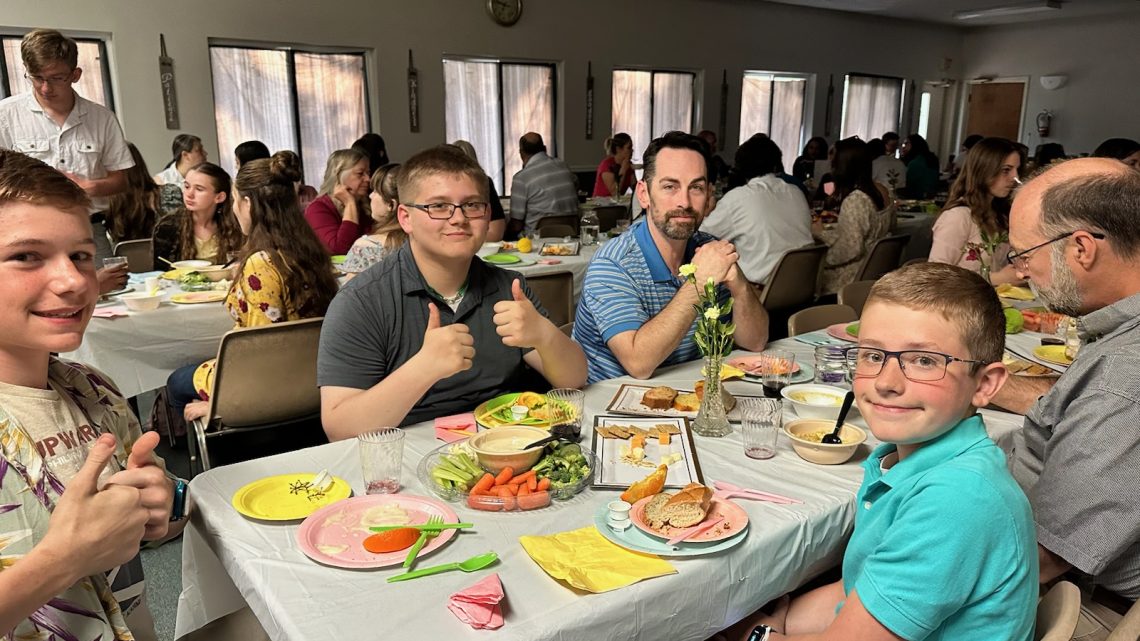This past April, students came from across Iowa and Missouri to Camp Heritage for a 7th -8th grade retreat. The theme of this retreat was Level-Up. Students enjoyed three days of games, fellowship and breakout sessions all focused on equipping them for the changes that await them in the next few years.
The Iowa-Missouri Conference was excited to host this event because they believe that students in the middle school grades are at a particularly important time of their lives. These early teenage years are full of physical, mental and spiritual changes. Students are transitioning to high school and leaving behind the elementary schools they have attended for most of their lives. These changes are not easy for teenagers and as a church and school community, we need to be intentional about helping them navigate this time of their lives while keeping them connected to their church and school family. As the popular three-legged stool metaphor describes, it is the partnership between the home, church and school that will help support teenagers as they journey through adolescence.
Leg 1: School
In Adventist schools, teachers are not just focused on providing an academic education to their teenagers but are purposefully and actively working to reveal the character of God through each subject. These teachers use inspiration to motivate their students and to instill in them a desire to learn. While the work that happens in the school every day is vital to the spiritual development of the child, without support, the work is incomplete.
Leg 2: Church
Churches that focus on providing dynamic and engaging programs like Pathfinders, Adventist Youth groups, and consistent Sabbath schools will find more of their youth continuing in the church. These programs help our teenagers develop friendships, create community and open doors to spiritual conversations. Many youth programs fell away during the time of COVID, and while it can be difficult, re-energizing these programs is critical. It is also important to find ways to engage youth in the work of the church. Whether they are helping in the AV department or serving as deacons or deaconesses, giving them responsibilities early will train them to be future leaders in our churches. It also provides teens with opportunities to be mentored by adults who are passionate about church service and the gospel mission.
Leg 3: Home
Ellen White says, “There is no more important field of effort than that committed to the founders and guardians of the home. No work entrusted to human beings involves greater or more far-reaching results than does the work of fathers and mothers” (AH 182.5).
Parents carry the biggest role in leading their teenagers to Jesus. No one is more aware of the spiritual battle being fought in the heart of each child than the parents. Daily they must fight the worldly influences which strive to take a hold of their teenagers. Parents must commit to spending time in prayer asking the Lord to give them the wisdom needed to equip their children to walk with the Lord in this ever-changing world. Time must be set aside for supervision and conversations. Parents must continue to insert themselves into the lives of their teenagers to help them as they face new temptations and experience new dynamics in relationships and to offer godly counsel. Churches and schools can help parents in this important work by offering Christian parenting workshops and creating a supporting community.
No one in any of these groups is going to be perfect. Raising teenagers can be challenging and there will be times when the church, school or home will be weak.
The good news is that we are not alone in this work. By allowing the Lord to lead and partnering with each other we can carry the gospel to the world, but it must begin in our own schools, churches and homes. Then we can celebrate the promise found in Phil. 1:6: “He who began a good work in you will carry it on to completion until the day of Christ Jesus.”
Melissa Morris is superintendent of education for the Iowa-Missouri Conference.










